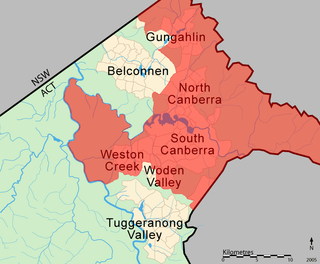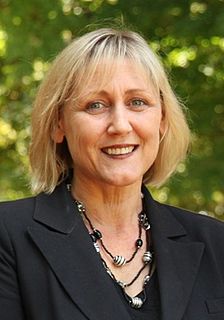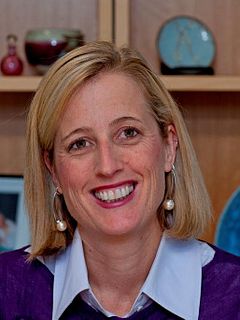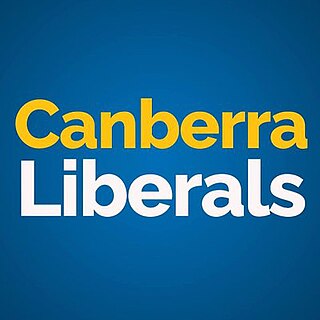Elections to the Australian Capital Territory Legislative Assembly were held on Saturday, 4 March 1989. This was the first direct election by voters in the Australian Capital Territory (ACT) for their own legislative body.
Elections to the Australian Capital Territory Legislative Assembly were held on Saturday, 15 February 1992, alongside a referendum on an electoral system for future elections. The incumbent Labor Party, led by Rosemary Follett, was challenged by the Liberal Party, led by Trevor Kaine. Candidates were elected to fill seats using a modified D'Hondt method for a multi-member single constituency. The result was another hung parliament. However, Labor, with the largest representation in the 17-member unicameral Assembly, formed Government with the support of Michael Moore and Helen Szuty. Follett was elected Chief Minister at the first sitting of the second Assembly on 27 March 1992.
Elections to the Australian Capital Territory Legislative Assembly were held on Saturday, 18 February 1995. The incumbent Labor Party, led by Rosemary Follett, was challenged by the Liberal Party, led by Kate Carnell. For the first time, candidates were elected to fill three multi-member electorates using a single transferable vote method, known as the Hare-Clark system. The result was another hung parliament. However the Liberals, with the largest representation in the 17-member unicameral Assembly, formed Government with the support of Michael Moore and Paul Osborne. Carnell was elected Chief Minister at the first sitting of the third Assembly on 9 March 1995.

Elections to the Australian Capital Territory Legislative Assembly were held on Saturday, 20 October 2001. The incumbent Liberal Party, led by Gary Humphries, was challenged by the Labor Party, led by Jon Stanhope. Candidates were elected to fill three multi-member electorates using a single transferable vote method, known as the Hare-Clark system. The result was another hung parliament. However Labor, with the largest representation in the 17-member unicameral Assembly, formed Government with the support of the ACT Greens and Democrats. Stanhope was elected Chief Minister at the first sitting of the fifth Assembly on 12 November 2001. The election was conducted by the ACT Electoral Commission and was the first time in Australia's history that an electronic voting and counting system was used for some, but not all, polling places.

Elections to the Australian Capital Territory Legislative Assembly were held on Saturday, 16 October 2004. The incumbent Labor Party, led by Jon Stanhope, was challenged by the Liberal Party, led by Brendan Smyth. Candidates were elected to fill three multi-member electorates using a single transferable vote method, known as the Hare-Clark system. The result was a clear majority of nine seats in the 17-member unicameral Assembly for Labor. It marked the first and so far only time in the history of ACT self-government that one party was able to win a majority in its own right. Stanhope was elected Chief Minister at the first sitting of the sixth Assembly on 4 November 2004. The election was conducted by the ACT Electoral Commission and was the second time in Australia's history that an electronic voting and counting system was used for some, but not all, polling places, expanding on the initial trial of the system at the 2001 ACT election.

The Molonglo electorate was one of the three electorates for the unicameral 17-member Australian Capital Territory Legislative Assembly between 1995 and 2016. It had seven seats, and was the largest of the three electorates in terms of population.

The 2010 Victorian state election, held on Saturday, 27 November 2010, was for the 57th Parliament of Victoria. The election was to elect all 88 members of the Legislative Assembly and all 40 members of the Legislative Council. The incumbent centre-left Labor Party government, led by John Brumby, was defeated by the centre-right Liberal/National Coalition opposition, led by Ted Baillieu. The election gave the Coalition a one-seat majority in both houses of parliament.

Elections to the Australian Capital Territory Legislative Assembly were held on Saturday, 18 October 2008. The incumbent Labor Party, led by Jon Stanhope, was challenged by the Liberal Party, led by Zed Seselja. Candidates were elected to fill three multi-member electorates using a single transferable vote method, known as the Hare-Clark system. The result was another hung parliament with Labor winning seven seats, the Liberals six seats and the Greens finishing with four seats, giving the Greens the balance of power in the 17-member unicameral Assembly. On 31 October 2008, after almost two weeks of deliberations, the Greens chose to support a Labor minority government. Consequently, Labor was re-elected to a third consecutive term of government in the ACT. Stanhope was elected Chief Minister at the first sitting of the seventh Assembly on 5 November 2008.
Shane Stephen Rattenbury, Australian politician and former Speaker of the ACT Legislative Assembly, is a member of the multi-member unicameral Australian Capital Territory Legislative Assembly representing the electorate of Molonglo for the ACT Greens since 2008. He was the first Speaker in any Parliament in the world representing a Green political party.

Meredith Hunter, Australian politician, is a former member of the multi-member unicameral Australian Capital Territory Legislative Assembly representing the electorate of Ginninderra for the ACT Greens from 2008 to 2012. She was also the Parliamentary Convenor of the ACT Greens.
This article provides information on candidates who stood for the 2005 Western Australian state election, held on 26 February 2005.
This article provides information on candidates who stood for the 2001 Western Australian state election, held on 10 February 2001.

The 2016 Northern Territory general election was held on Saturday 27 August 2016 to elect all 25 members of the Legislative Assembly in the unicameral Northern Territory Parliament.

The 2014 Tasmanian state election was held on 15 March 2014 to elect all 25 members to the House of Assembly. The 16-year incumbent Labor government, led by the Premier of Tasmania Lara Giddings, sought to win a fifth consecutive term against the Liberal opposition, led by Opposition Leader Will Hodgman. Also contesting the election was the Greens led by Nick McKim. The Palmer United Party made a significant effort in the election.

Elections to the Australian Capital Territory Legislative Assembly occurred on Saturday, 20 October 2012. The 11-year incumbent Labor Party, led by Chief Minister Katy Gallagher, won a fourth term over the main opposition Liberal Party, led by opposition leader Zed Seselja.

A general election for the Australian Capital Territory Legislative Assembly was held on Saturday, 15 October 2016.

The next Tasmanian state election is scheduled to be held in or before 2022 to elect all 25 members to the House of Assembly.

The Canberra Liberals, officially the Liberal Party of Australia , is the division of the Liberal Party of Australia in the Australian Capital Territory (ACT). The party has been in opposition in the ACT Legislative Assembly for much of its existence, but held power with the support of minor parties and independents between 1989 and 1991 and again between 1995 and 2001.









